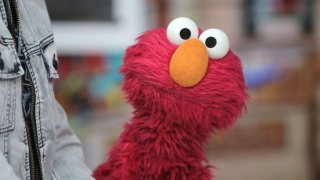
When Elmo posted a casual wellness check online earlier this year, the “Sesame Street” character unwittingly opened the floodgates to a deluge of online angst.
In January, Elmo had asked X users a seemingly innocent question: “Elmo is just checking in! How is everybody doing?” — only to be met with declarations of “existential dread,” mental burnout and general disenchantment with daily life.
The dreary responses inspired Sesame Workshop, the nonprofit behind “Sesame Street,” to undertake a survey project focusing on the “state of well-being in America.”
We've got the news you need to know to start your day. Sign up for the First & 4Most morning newsletter — delivered to your inbox daily. Sign up here.
Conducted in partnership with consulting and market research firm The Harris Poll, "The State of Well-Being Report" interviewed 2,012 members of the U.S. population ages 16 and older in May. The survey was published Tuesday.
When asked about what they prioritize when it comes to the future of well-being, the majority of the participants found mental health nearly as important as economic stability, according to the findings.
“We could not have predicted the overwhelming response that followed Elmo’s post,” Samantha Maltin, chief marketing and brand officer of Sesame Workshop, said in a news release, adding that the Muppet’s post drew millions of responses. “As Elmo’s viral moment and this new study indicate, the most pressing issue facing American families right now is mental health and emotional well-being.”
Health
0 seconds of 1 minute, 28 secondsVolume 89%
A third of parents and half of teens also said mental health issues significantly affect their well-being, with many parents citing lack of access to high-quality education and consequences of the Covid-19 pandemic as sources of negative impact.
Other common stressors on well-being reported in the survey include physical health, the effects of climate change, lack of a strong network of friends or family, and racism or discrimination.
When Elmo’s innocent question went viral in January, the official X account for “Sesame Street” shared a link to mental health resources.
Aaron Bisman, the vice president of audience development at Sesame Workshop, told NBC News at the time that “leveraging the interest in Elmo’s tweet” to share resources for emotional well-being is “exactly what Sesame Workshop was created to do.”
Despite all the apparent doom and gloom online, the survey also reported a glimmer of hope for the next generation of Americans: 67% of those interviewed said they wish their parents had been more honest about their own mental health struggles, including 79% of parents.
A majority of Gen Z and millennials — as well as 71% of educators surveyed — also said that they believe schools “should focus on social and emotional skills just as much as academics.”
While there appears to be a significant gap between the percentage of participants who believe they themselves practice kindness (93%) and those who believe the average American is kind (55%), a vast majority of people surveyed said it’s important to promote kindness in society.
In an appearance in February on NBC’s “TODAY” show, Elmo shared a message of empathy and urged people to check in on their friends.
“It’s important to remember that we all have a lot of feelings, and that’s OK,” the furry red Muppet said. “It’s good to know what feeling you’re having, and if you’re feeling sad or worried or confused, then you have to talk to someone that you love and trust, and it’s good to talk about it.”
This story first appeared on NBCNews.com. More from NBC News:



